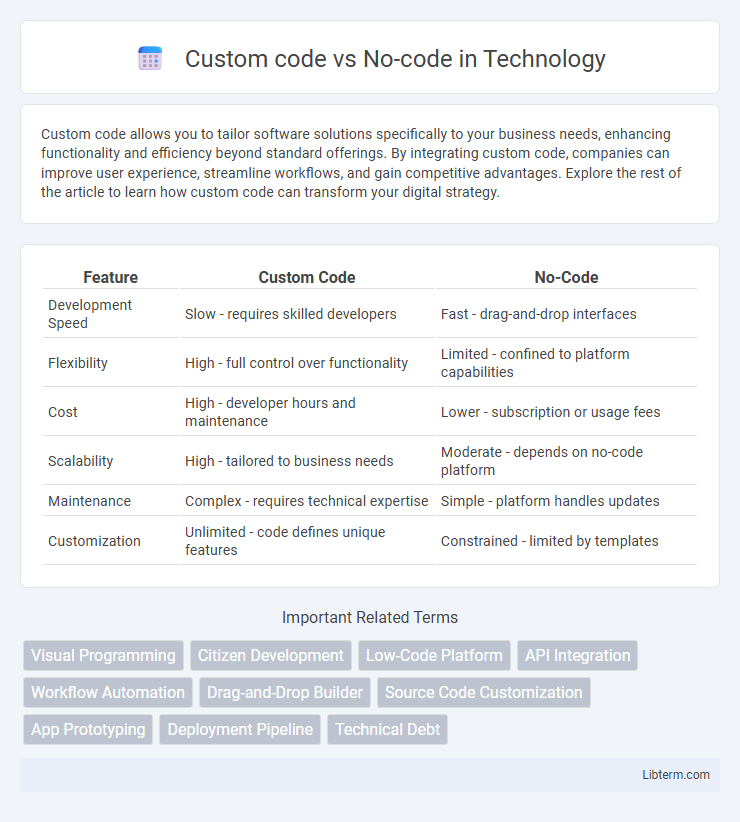Custom code allows you to tailor software solutions specifically to your business needs, enhancing functionality and efficiency beyond standard offerings. By integrating custom code, companies can improve user experience, streamline workflows, and gain competitive advantages. Explore the rest of the article to learn how custom code can transform your digital strategy.
Table of Comparison
| Feature | Custom Code | No-Code |
|---|---|---|
| Development Speed | Slow - requires skilled developers | Fast - drag-and-drop interfaces |
| Flexibility | High - full control over functionality | Limited - confined to platform capabilities |
| Cost | High - developer hours and maintenance | Lower - subscription or usage fees |
| Scalability | High - tailored to business needs | Moderate - depends on no-code platform |
| Maintenance | Complex - requires technical expertise | Simple - platform handles updates |
| Customization | Unlimited - code defines unique features | Constrained - limited by templates |
Introduction to Custom Code and No-Code
Custom code involves writing programming languages such as JavaScript, Python, or Ruby to build tailored software solutions that provide complete control over functionality and design. No-code platforms enable users to create applications using graphical user interfaces and pre-built components without requiring any programming knowledge, significantly speeding up development time. Choosing between custom code and no-code depends on factors like project complexity, scalability needs, and available technical expertise.
Key Differences Between Custom Code and No-Code
Custom code offers unparalleled flexibility and control by allowing developers to write tailored software solutions using programming languages, whereas no-code platforms enable users to create applications through visual interfaces without programming knowledge. Custom code requires programming expertise and longer development cycles but supports complex, highly customized functionalities; no-code solutions emphasize speed and ease of use, ideal for simple to moderately complex applications with limited customization. Cost efficiency varies as custom code incurs higher upfront investment but scales better long-term, while no-code reduces initial costs but may face limitations and scalability challenges.
Advantages of Using Custom Code
Custom code offers unmatched flexibility, enabling developers to create highly tailored solutions that precisely meet unique business requirements. It supports better integration with existing systems and allows for advanced functionalities not achievable with no-code platforms. This level of control can lead to optimized performance, scalability, and enhanced security for complex applications.
Benefits of No-Code Platforms
No-code platforms enable rapid application development by allowing users to build software visually without writing complex code, significantly reducing time-to-market and dependency on specialized developers. These platforms foster greater accessibility for non-technical stakeholders, boosting collaboration and innovation across departments. The flexibility to iterate quickly on no-code tools also lowers development costs and accelerates response to changing business requirements.
Limitations of Custom Code Solutions
Custom code solutions often face limitations such as increased development time, higher maintenance costs, and the need for specialized technical expertise. Scalability can be constrained by the complexity and quality of the codebase, leading to potential performance bottlenecks. Security risks also arise if custom code is not regularly updated or audited for vulnerabilities, impacting overall system reliability.
Drawbacks of No-Code Development
No-code development platforms often face limitations in customization, restricting complex functionalities and integrations compared to custom code. Performance issues can arise due to less optimized backend processes, impacting scalability for enterprise-level applications. Dependency on platform-specific tools may lead to vendor lock-in, reducing flexibility and increasing long-term maintenance costs.
Ideal Use Cases for Custom Code
Custom code excels in scenarios requiring highly specialized functionality, complex integrations, or scalable performance that off-the-shelf no-code platforms cannot provide. Enterprises developing proprietary software, intricate automation workflows, or unique user interfaces benefit from tailor-made solutions. Custom code supports advanced customization for business-critical applications with specific security, compliance, and data handling requirements.
When to Choose No-Code Solutions
No-code solutions are ideal for businesses seeking rapid deployment and ease of use without extensive technical expertise, particularly for simple to medium-complexity applications. They enable non-developers to build functional products with drag-and-drop interfaces, reducing development time and costs significantly. Choosing no-code platforms is advantageous when scalability and customization requirements are limited, and quick iteration is necessary.
Cost Comparison: Custom Code vs No-Code
Custom code development often involves higher upfront costs due to the need for skilled developers and longer development cycles, whereas no-code platforms reduce initial expenses by enabling faster deployment with minimal technical expertise. Maintenance and scalability expenses can increase for custom code as ongoing updates and bug fixes require specialized resources, contrasting with the subscription-based pricing models of no-code solutions that often include updates and support. Businesses must weigh total cost of ownership, considering custom code's flexibility and no-code's cost-efficiency for rapid prototyping and simpler applications.
Future Trends in Software Development
Future trends in software development indicate a growing integration of custom code and no-code platforms, enhancing flexibility and speed in application creation. Artificial intelligence and machine learning are driving advancements in no-code tools, enabling more complex and scalable solutions without extensive coding knowledge. Hybrid development approaches combining custom coding with no-code frameworks are becoming essential for businesses aiming to accelerate innovation while maintaining control over software customization.
Custom code Infographic

 libterm.com
libterm.com